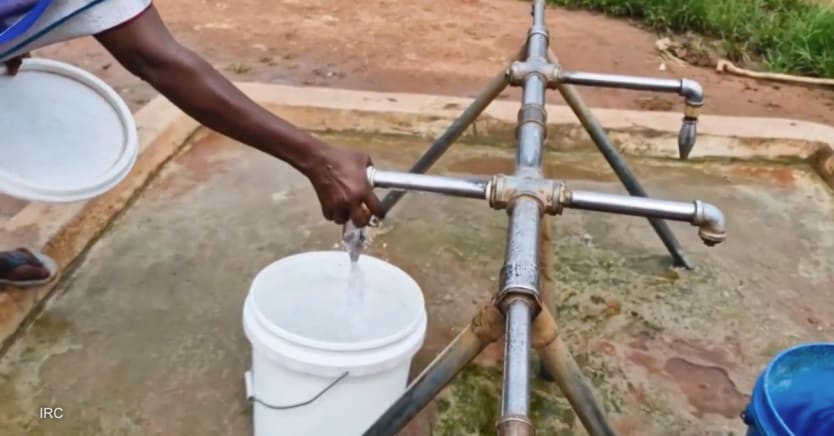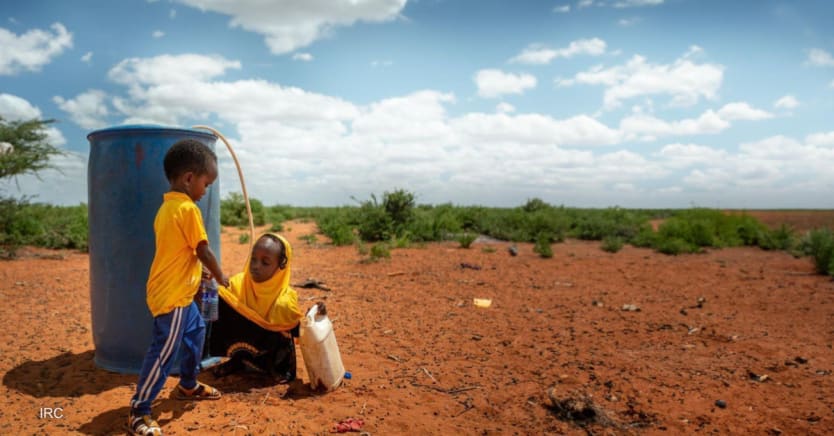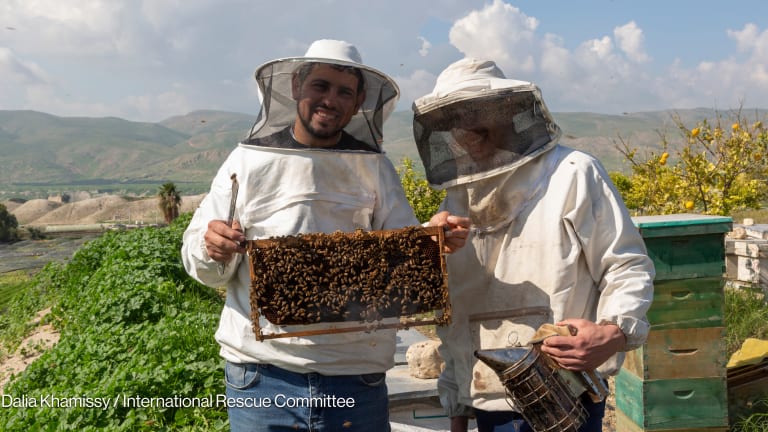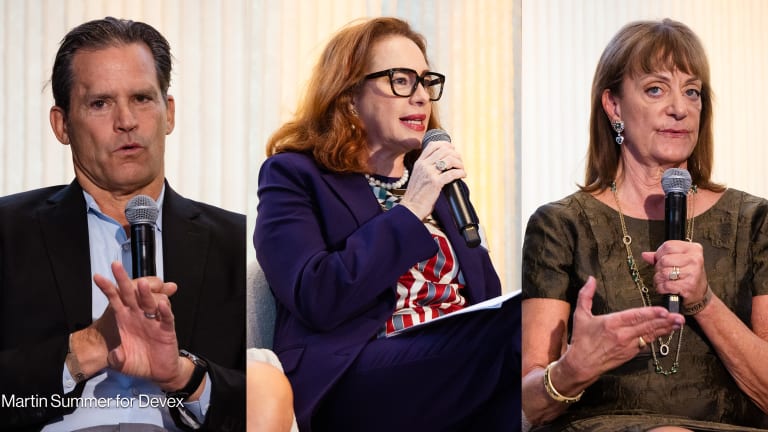
In 2023, the funding shortfall in meeting humanitarian needs reached an unprecedented $35 billion, according to the U.N’s Global Humanitarian Overview. That meant less than 40% of the required amount was secured, down from 50% the previous year.
This trend is concerning given the significant efforts to address growing humanitarian challenges, particularly in light of the protracted nature of crises and displacement. One big issue is that humanitarians and investors need each other’s skills and insights to launch properly targeted humanitarian initiatives, but have often worked in siloed ways because of different incentive structures.
In a bid to resolve this problem, the International Rescue Committee’s Airbel Impact Lab, with the support of DG ECHO, the European Commission’s Civil Protection and Humanitarian Aid Operations department, has developed a concept called the Advisory Model for Investor and Humanitarian Partnerships. The aim is to strengthen collaboration across sectors, with humanitarians providing contextually relevant, localized consultancy to advise investors on a project’s social impact.
Under the model, the organization has so far been running several pilot projects in areas such as wastewater treatment and sustainable energy in countries including Iraq, Jordan, and Lebanon.
“The hope is that sharing our work on the advisory model publicly will help catalyze more of these projects,” said Ellen Brooks Shehata, director for innovative finance at the Airbel Impact Lab. Speaking to Devex, she talked about the origins of the model and what’s happening on the ground.
This conversation has been edited for length and clarity.
Why is a new model needed for funding humanitarian aid?
I joined the International Rescue Committee from JPMorgan — so I came from asset management on Wall Street. The thing that shocked me most when I arrived was this number published annually by the U.N. that around 50% or more of the yearly humanitarian need goes unfunded. The figure of around $35 billion in 2023 can be the size of just one fund in the world I came from.
“The humanitarian-development-peace nexus has been talked about in policy circles forever, but how do you actually implement it?”
— Ellen Brooks Shehata, director for innovative finance, Airbel Impact LabSo, I was thinking, what’s going on here? And I was interested in what levers needed pulling to unlock some of that capital for the humanitarian sector. From there, the idea arose for new ways of partnering between humanitarians and investors.
The biggest enabling factor for funding is the relationships you build across sectors because as soon as a humanitarian has someone on the investor side who gets it, they’re going to be your biggest ally.
How does your career background help you in developing the advisory model, and what are the keys to the two sides engaging with each other?
Having JPMorgan on my resume helps when speaking to bankers. We’ve learned that much of innovative finance in the humanitarian sector is about acting in the role of translator, going back and forth between sectors that often don’t speak to each other.
Previously, there was a lot of distrust between the two sides. But as we’ve seen investor momentum grow on climate change and environmental, social, and corporate governance, the private sector has had to make these factors integral in their operations and become much more vocal about support for communities. That’s something humanitarians know how to do, creating space for a dialogue that maybe wouldn’t have been possible a decade ago.
You have released a playbook to support the advisory model. What was the idea behind it?
When we started this journey nearly three years ago, we wanted to rigorously document our process. We decided that people needed to stop talking about the problem of driving capital into the humanitarian sector and start doing something about it. The humanitarian-development-peace nexus has been talked about in policy circles forever, but how do you actually implement it?
After spending the past three years in the trenches, we thought the best thing to produce would be a playbook to guide investors and humanitarians. It contains an explanation of the advisory model and a checklist to go through with your team to implement it and ask: “Did we do this, did we do that?” The hope is that people will take the lessons we’ve learned and evolve it into their own partnership models.
Advisory Model Partnership Playbook
To help humanitarians and investors use and leverage the advisory model, the IRC with the support of DG ECHO has developed an “Advisory Model Partnership Playbook,” a tool that provides guidance on how to implement the advisory model and key lessons learned so far.
The playbook is available here for download.
What’s being done on the ground with the advisory model, and what have its main achievements been so far?
The first project we started under the model is a wastewater infrastructure investment, financed by the European Bank for Reconstruction and Development to benefit both local residents and refugees in west Irbid in Jordan, near the Syrian border. In total, the project will provide urgently needed sewage infrastructure to over 120,000 people. Collaborating with the European Bank for Reconstruction and Development, IRC has ensured that Syrian refugees have been included in all phases of the community engagement and stakeholder strategy so far.
There, we have an IRC colleague, Mohammad Al-Damen, who is literally the boots on the ground for because he was born and raised in Irbid — so knows it like the back of his hand. Having that local knowledge has been a big value-add to everyone on the project team. He’s now sharing that capacity by running local community and civil society training sessions, helping other organizations understand how to build those cross-sector partnerships.
What’s been really nice in this project has been building more of an institutional relationship between IRC and EBRD. Now, we know what one another is good at, and hopefully, we’ll be able to continue working together long after this project.

Can you give other examples of projects you’re running?
We have about eight pilots in various stages of contracting in the Middle East, Africa, and Latin America. One that we’re really excited about is in Iraq, Jordan, and Lebanon with Flat6Labs, a startup accelerator that wants to increase the proportion of refugee-led businesses there. It’s early days, but with IRC’s help, the organization has been able to reach a subset of refugees and internally displaced people that it didn’t have access to before.
What I like about this project is that it doesn’t build a new accelerator, but helps an existing one — so it’s not taking a ton of new resources, nor starting without a track record. We’re expanding that partnership throughout this year and will hopefully take it to other countries too.
Another project is our partnership with AquaPoro Ventures, a climate-tech startup in Jordan developing an innovative technology to produce drinkable water from air vapor. This type of partnership aids investment in the local startup economy while providing a more sustainable solution to IRC’s drinking-water procurement.
The hope is that the advisory model will help catalyze more of these projects, with development finance institutions and private sector investors seeing partnerships as a way to mitigate risk going into communities that they might not know.
What’s your long-term outlook and hope for the advisory model?
We’re trying to stand up as many proofs-of-concept as we can, with enough variation to show some sort of mean pattern. By sharing our work, I’m hopeful others will come in to do the same, while projects will move from pilots to a more robust, institutionalized way of working.
At the end of the day, we’re in a situation in which investment can answer the call for a lot of needs — so it’s about finding the right people who can answer that call. I hope we can also continue to evolve partnerships. If you look at the reality of building a better world, it is multidisciplinary, intersectional, and diverse — and it requires you to be aware of so many things in your decision-making.









